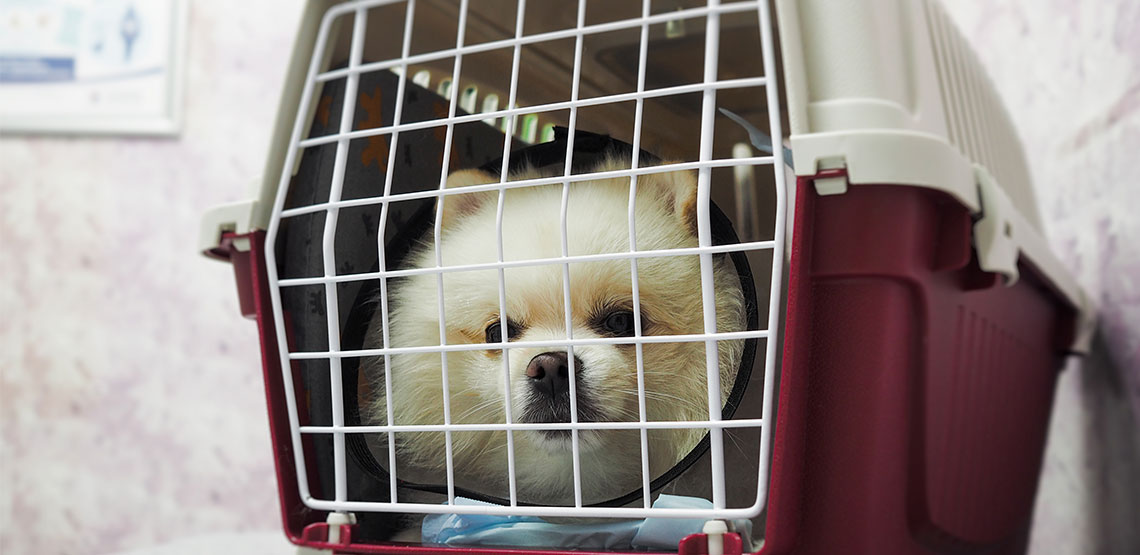What Type of Crate Does Your Dog Need?
As a dog owner, it’s important to know which products you will need to properly care for your pet. Some will be used for training, while others can be used for daily routines. While some dog owners don’t like using dog crates, they are incredibly helpful items to have around for a variety of different reasons, including both training and daily routines.
It can be difficult to know how to pick out a dog crate, so we’ve put together a list of things to consider before making a final purchase.
Size Matters
Depending on what size of dog you have, you’ll need to have a certain sized crate that ensures your dog will be as comfortable as possible. You don’t want to buy a crate that’s too small for your pet, as they’ll just end up hitting their head on the crate and feeling incredibly distressed.
Some owners make the mistake of buying a crate that is too large for their dog. While you may think it’s better to let the dog have more room, this could ruin the purpose of the crate if you’re buying it for housetraining or potty training purposes.
To find the correct size crate for your dog, you should always measure your dog and a potential crate before purchasing. Make sure your dog has enough room to sit up, move around, turn around, and lay down in the crate.
If you have a puppy and don’t want to keep on buying new crates as they grow and get bigger, we recommend buying an adult size crate and then using some of the extra wiring dividers to block off half of the inside of the crate. This way, your puppy isn’t in a huge adult crate and can only enter a certain section of the crate. Then, when your dog is old enough, just simply unattach the added wiring divider.
To make thing easier, here is a quick and simple list of appropriate sized crates for specific breeds:
- XS 18" - 22" crates are best for extra small dogs, such as Boston Terriers, Yorkshire Terriers, Pugs, Pomeranians, and Chihuahuas
- 24" crates are best for small dogs, such as Jack Russells, Toy Poodles, Scottish Terriers, and Miniature Daschunds
- 30" crates are best for medium dogs, such as Cocker Spaniels, King Charles Spaniels, French Bulldogs, and American Pit Bull Terriers
- 36" crates are best for large dogs, such as Welsh Corgis, Beagles, Bulldogs, English Setters, and Basset Hounds
- 42" crates are best for extra large dogs, such as Labrador Retrievers, Dalmatians, Border Collies, Siberian Huskies, Golden Retrievers, and German Shepherds
- 46" - 72" crates are best for giant dogs, such as Great Danes, St. Bernards, Bernese Mountain Dogs, Greyhounds, and Old English Sheepdogs
Related Search Topics (Ads):
How to Pick the Right Crate
When picking out the right crate for your dog, you need to make sure you get the right size. You should also make sure you look at the material it’s made from. If you have a specific area of your house where you want your crate to be, make sure you plan ahead. This way, you can pick a certain design or color that would be best for your house.
The different type of crates you can buy are as follows:
- Wire crates (the most popular)
- Soft-sided crates
- Plastic crates
- Stylish crates (like wooden ones)
The style or type of crate just depends on what you want, and what you think would be best for your dog. As long as your dog will be able to move around in the crate and be as comfortable as possible, the type of crate you decide on doesn’t matter!
Why You Should Own a Dog Crate
There are a number of different reasons for why you should own a dog crate. If you just got a puppy and are trying to housetrain it, putting them in a crate is probably the best way to make them realize to not go in the house when you’re gone.
But really, having a dog crate at every stage of your dog’s life is important. You never know when you might need it! If you have friends over and one is scared of dogs, you can just put your dog in the crate for the time being, instead of making them be alone in a room or put outside.
Dog crates can create a sense of comfort and security to a dog. With blankets and a bed, some dogs could even prefer to continuously sleep in their nice crate instead of elsewhere.
If you plan on traveling and need to bring your dog in the car, it can be difficult. Dogs love car rides, but they can also distract you when you’re on the road. Crates are transferable, and you can always put your dog in their crate in the back of the car (if you have a car big enough, that is).
There are lots of reasons why dog crates are important, and you should always make sure you have one throughout every stage of your dog’s life.
